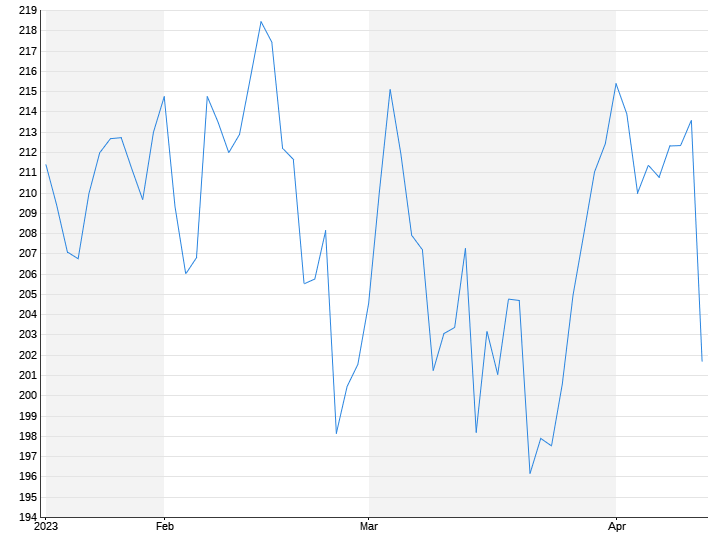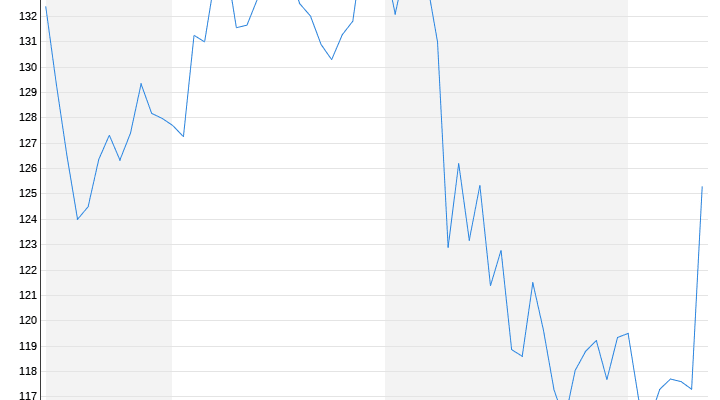Wall Street gives up profits
Interest rate worries are back
04/14/2023 10:46 p.m
Wall Street’s hopes of an imminent interest rate freeze have quickly evaporated. Hints from the Fed that monetary policy needs to be tightened further spoil investors’ mood. US banks are coming up with surprisingly strong numbers.
At the end of the week, Wall Street gave back part of the strong gains of the previous day to the highest levels since mid-February. The US stock exchanges were burdened by interest rate concerns that had boiled up again. The Dow Jones Index lost 0.4 percent to 33,887 points – burdened by significant discounts on Boeing shares. S&P 500 and Nasdaq Composite lost 0.2 and 0.4 percent respectively. On the Nyse, 964 (Thursday: 2101) course winners were counted and 2,007 (885) losers. 87 (102) titles closed unchanged. Contrary to the negative market trend, the banking sector rose by 3.5 percent – supported by convincing quarterly figures from various large banks.
The hope that interest rate hikes would end soon, which had been played the day before in the wake of unexpectedly low inflation data, cracked. Weak retail sales in March, which fell twice as much as economists had expected, still fit into the picture of a cooling economy with perhaps even falling interest rates. The import prices, which have fallen more sharply than expected, did not stand in the way of this consideration either. However, industrial production in March, which rose more sharply than forecast, was a positive surprise, as was the brightened mood among US consumers in April.
Fed officials fuel interest rate fears
The consumer sentiment index calculated at the University of Michigan rose more significantly than expected. US consumers play a key role in the US economy because around 70 percent of gross domestic product depends on private consumption. In this respect, US consumers who were willing to spend did not speak for a recession or for inflation to ease. Fed Governor Christopher Waller sounded like a wake-up call: “Monetary policy must be further tightened,” said Waller unequivocally.
“This is one of the more aggressive statements we’ve made in recent weeks. A lot of the Fed’s statements have been in the direction of a ‘one-off’ rate hike,” said State Street market strategist Marvin Loh. Penn Mutual Asset Management analyst Jackie Rogowicz characterized Waller’s statements as “extremely hawkish.” Austan Goolsbee, Waller’s Fed colleague from Chicago, put a bit of a brake on this but failed to soothe the market. Instead, he warned of a recession, which didn’t sit well with the market either.
Dollar with countermovement
The dollar rallied after the recent drop, with the dollar index gaining 0.6 percent. Waller’s statements coupled with the positive consumer sentiment data fueled renewed speculation about rate hikes. After hitting its high for the year at $1.1076, the euro fell below the $1.10 mark as the dollar strengthened. On the bond market, falling prices coupled with renewed speculation about interest rates pushed yields up significantly. The strength of the dollar and rising market interest rates weighed on the price of gold.
Oil prices, however, rose moderately; the improved economic data in the US, but also in China, where consumer confidence had also jumped, should fuel demand, it said. The International Energy Agency warned that the Opec+ cartel group’s output cuts could imbalance the oil market more and sooner than originally estimated. Overall, the fourth weekly premium was booked. US light oil of the grade STI has increased in price by 24 percent in the past four weeks – supported by OPEC+ subsidy cuts.
US banks surprise positively – Boeing with setback
Bank prices rose against the negative market trend. Because the results of JP Morgan, Citigroup as well as Wells Fargo for the first quarter had all surprised positively – all three financial institutes earned more than expected. JP Morgan was up 7.6 percent and Citigroup was up 4.8 percent. Wells Fargo turned negative over the course of the year, the stock had been doing well since the beginning of April.

The Boeing stock lost 5.6 percent. The US aircraft manufacturer had stopped deliveries of some 737 Max machines because of incorrectly installed parts. Spirit Aerosystems Holdings said separately that the company was the supplier that alerted Boeing to the problem and is working on a solution to repair the affected fuselages. Spirit Aerosystems’ stock plummeted 20.7 percent. Blackrock (+3.1%) delivered weak first quarter numbers, but first quarter earnings beat market expectations.
